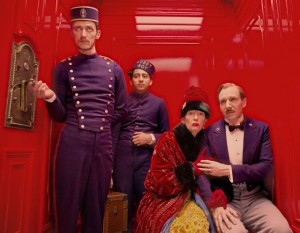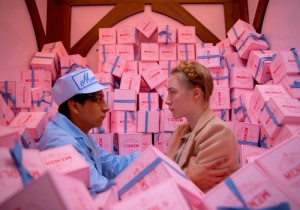
Coming quickly on the heels of the success of Moonrise Kingdom, director Wes Anderson has returned with yet another unique feature. Inspired by the writings of Austrian author Stefan Zweig, The Grand Budapest Hotel is certainly unlikely to convert new followers to the filmmaker’s eccentric storytelling approach. However, those who can appreciate the director’s quirks and synchronize with the film’s unconventional wavelength will find the accommodation absolutely first rate.
 Taking place over three distinct time periods, the main framing story finds a young author (Jude Law) describing his travels long ago to the Grand Budapest Hotel. While visiting the establishment, he encounters the mysterious M. Moustafa (F. Murray Abraham), who spins a yarn detailing not only the hotel’s great history, but of his experiences in the 30’s as a young Bellboy (played by Tony Revolori) under the tutelage of concierge Gustave (Ralph Fiennes). The beloved Gustave has his own predilections and soon finds himself a murder suspect after the death of a wealthy hotel guest (Tilda Swinton). The caretaker must evade the victim’s crooked family (including Adrian Brody and Willem Dafoe) and German police (led by Edward Norton) to prove his innocence.
Taking place over three distinct time periods, the main framing story finds a young author (Jude Law) describing his travels long ago to the Grand Budapest Hotel. While visiting the establishment, he encounters the mysterious M. Moustafa (F. Murray Abraham), who spins a yarn detailing not only the hotel’s great history, but of his experiences in the 30’s as a young Bellboy (played by Tony Revolori) under the tutelage of concierge Gustave (Ralph Fiennes). The beloved Gustave has his own predilections and soon finds himself a murder suspect after the death of a wealthy hotel guest (Tilda Swinton). The caretaker must evade the victim’s crooked family (including Adrian Brody and Willem Dafoe) and German police (led by Edward Norton) to prove his innocence.
Of course, there are several other subplots and complications adding to the troubles, including a missing piece of valuable art, a love story between the Bellboy and a confection baker (Saoirse Ronan), a secret organization of concierges, as well as the oncoming occupation and war. There’s a lot to take in and Fiennes, Revolori and the rest of the cast deliver the rapid fire dialogue at an incredible pace. The approach at times calls back to the films of Billy Wilder – so much is happening and so many humorous lines are being spoken so fast that a second viewing may be necessary to catch all the nuances of Fiennes’ exemplary performance.
Technically, the film is a marvel as well. Filed using multi-aspect ratios for different time era lends each segment a strong distinction. Most of the film is framed in a box shaped 1.33:1 like the classic films of yesteryear. The photography displays a rich and deep color palate including heavy and deep oranges, reds and browns. There’s a lot of shadow present as well when the film takes darker turns involving villainous plots and deserted back alleys. Cinematographer Robert Yeoman’s images are marvelous to look at. Composer Alexandre Desplat often utilizes a zither, and as a result the general tone of the second half echoes Carol Reed’s The Third Man, albeit with a deliriously dark and oddball comic bent.
 The film also features so many hysterical and surprising cameos that it is difficult to keep track of them all. With so many characters walking in and out of the film, it’s almost overwhelming. As a result of a story so jam-packed with oddballs, one slight caveat has to do with the Bellboy’s relationship with the baker. It certainly works, but just a little more time spent between them could have resulted in a more powerful ending with an even greater emotional impact. However, this is the most minor of qualms and the movie hardly suffers for it.
The film also features so many hysterical and surprising cameos that it is difficult to keep track of them all. With so many characters walking in and out of the film, it’s almost overwhelming. As a result of a story so jam-packed with oddballs, one slight caveat has to do with the Bellboy’s relationship with the baker. It certainly works, but just a little more time spent between them could have resulted in a more powerful ending with an even greater emotional impact. However, this is the most minor of qualms and the movie hardly suffers for it.
In all, it’s a fascinating trip that should develop as large a following as the director’s other works. This is a memorable filmic experience that both harkens and pays tribute to the past while creating something new, fresh and unique. Despite all the cinematic references mentioned, The Grand Budapest Hotel has its own distinct character that will entertain visitors for some time to come.


